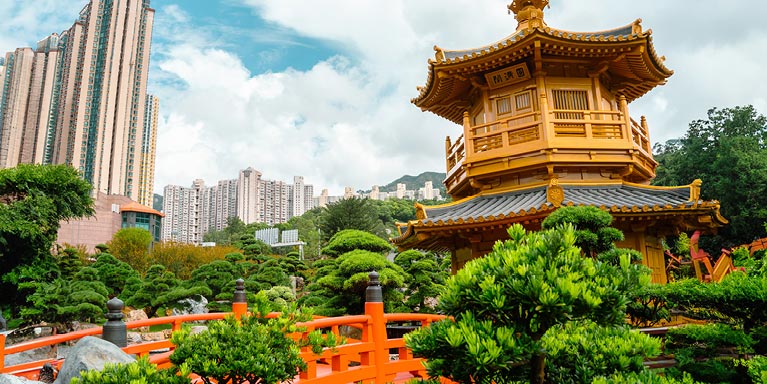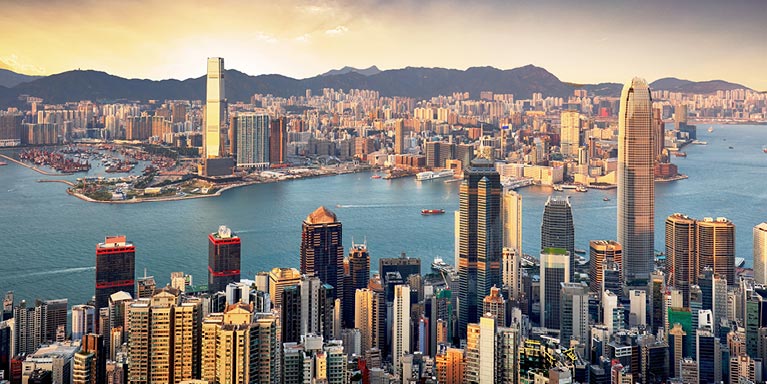
A guide to Hong Kong
Our expert view on expat life in a modern global city

Hong Kong is a bustling international city that attracts talented professionals from across the world. It generally offers higher salaries and an excellent quality of life, with good opportunities for career progression. It’s also a great place to be based if you want to explore the rest of Asia.
In this guide, we’ll look at the things that are good to know to help you settle quickly into your new life. And, if you’re thinking of moving abroad, we’ll be by your side as you embark on your latest adventure.
- Population: Around 7.5 million
- Currency: Hong Kong dollar (HK$) (HKD)
- Capital: Victoria
- Biggest cities: Central and Western, Kowloon
- Main language: Cantonese, English and Mandarin
- Main religion: Buddhism, Taoism and Christianity
- Political system: Special Administrative Region of China with executive, legislative, and judicial powers devolved from the national government, operating on a ‘one country, two systems’ principle
- International dialling code: +852
- Emergency services: 999
- Driving: On the left, like the UK
-
Careers
The focus on free and fair competition has made Hong Kong attractive to multinational businesses, particularly financial services, and it has one of the world’s highest per capita GDPs. Salaries are high, especially for people in finance or executive positions, and there’s a lot of opportunities for expats who want to progress their career. Some employment packages may even include a housing allowance and medical insurance.
Business culture is conservative, with an emphasis on professionalism, punctuality, respect, and deference to seniority. When greeting someone, shake hands, then exchange business cards using both hands as a sign of respect. Gifts are given at first meetings and on important anniversaries, and should also be received with both hands, then opened in private later.
Education
Education is treated seriously in Hong Kong – teachers are respected, and students are well behaved. The school year runs from September to July, with a long summer holiday.
Most children go to government-funded public schools. Although, if you’re on a temporary visa, you may have to pay fees. Children go to schools in their catchment area, which can affect property prices in areas with good schools.
A lot of private schools tend to teach in Cantonese. Standards are high, but learning is often through repetition. Private tutoring is common due to the competitive nature of these schools and children often spend several hours at extra lessons after school.
There are international schools in Hong Kong that follow British, American, and Australian curricula, but competition for places is fierce. It’s advisable to contact schools before you move or ask your employer to help you secure a place.
-
Moving money
Putting the right banking arrangements in place is vital for expats around the world. You want to be able to access and transfer money easily, and with a bank you can trust to comply with international regulations. Most people have two banks – one in their home country and one local to where they’re living. If your bank has a global network, you may be able to set up an account ahead of your arrival, which gives you time to assess the financial market.
It’s important to understand how foreign exchange works and how fluctuating exchange rates can affect you. When you’re juggling finances in multiple currencies, remember that the currency markets can move quickly and make a big difference to the value of your money.
To help you reduce the risk of fluctuating currency, you could choose a foreign exchange that lets you fix an exchange rate for a fixed period. Then you’ll know exactly how much you need to convert, whatever happens in the market.
Budgeting
When you’re looking to move to a new country, you need to consider how a change in the cost of living could affect your finances. If you’re moving with your job, sometimes your employer may help with expenses, such as accommodation or school fees. Remember to account for setup costs, such as buying furniture and sorting insurance, when you’re thinking about your budget.
Costs
Some of our international accounts have a monthly fee, such as the International Account. The account offers fee-free International Payments (correspondent and recipient bank charges may apply) and 24/7 worldwide access. While our services will be for many of our customers, there are countries where, due to legal or regulatory restraints, we can’t provide them.
Financial planning
While it’s going to be a busy time, it’s also worth setting some time aside to review your financial plans, like whether you want to open an offshore account. They offer the convenience of keeping your money in one place, so you can stay with the same bank no matter where life takes you.
Your expat status could give you new opportunities that weren’t available to you at home. However, tax rules differ from country to country, so if you’re unsure about your personal tax obligations, you should seek professional advice.
Lloyds Bank International Private Banking is by your side every step of the journey as you start your new life abroad. We offer international knowledge, experience and dedicated expert support to help meet all your financial needs. From savings to international payments and transfers, we can help you navigate the complex world of wealth management away from home.
Security
Offshore accounts are not protected by the Financial Services Compensation Scheme (FSCS), which protects savings up to £85,000 with authorised UK banks and building societies.
However, our accounts are covered by other schemes. The Jersey Bank Depositor Compensation Scheme, the Isle of Man Depositors’ Compensation Scheme and the Guernsey Banking Deposit Compensation Scheme offer protection for eligible deposits of up to £50,000.
Tax
There are three separate income taxes in Hong Kong:
- Salaries tax – levied on net chargeable income at progressive rates ranging from 2% to 17%, or at a flat maximum rate of 15% on assessable income, less personal deductions, whichever is lower. It must also be paid on income earned from an office, employment or services rendered in Hong Kong during visits longer than 60 days in the tax year.
- Profits tax – the rate of tax for the first HKD2 million of profits of unincorporated businesses is reduced from 15% to 7.5%. The remainder continues to be taxed at 15%. Any profession, trade or business in Hong Kong is subject to profits tax on income arising from that.
- Property tax – a flat rate of 15% on rental income after a standard deduction of 20%. If you receive rental income but the rental activities do not constitute a business, the income is subject to property tax instead.
Hong Kong has double tax agreements with 45 countries to avoid individuals paying the same tax twice. It’s worth checking if this could apply to you.
If beneficial, a permanent or temporary Hong Kong resident individual may elect to have a personal assessment on the aggregate of their income or losses from all sources.
A basic allowance of HKD132,000 or married person's allowance of HKD264,000 (if spouse has no chargeable income or elects for joint assessment) is available.
Interest income not derived from investing the funds of a business and all dividend income are exempt from taxation.
Stock options and share awards provided by an employer are generally taxed as part of the remuneration package.
Hong Kong does not have capital gains, estate, or social security taxes.
The tax authority is the Inland Revenue Department (IRD) and the tax year runs from 1 April to 31 March, with the tax return date of 31 October. See Inland Revenue Department (ird.gov.hk) for further information.
Accommodation
There’s a wide range of accommodation available in Hong Kong – from small apartments to luxury villas. Apartments are the most common due to the lack of available space and large number of people concentrated in a relatively small area. This makes the market very competitive and average rent prices high, but the standard is generally good. Many apartments are unfurnished with a few basic appliances and limited storage space. You’ll also need around 3.5 months’ rent saved to pay the deposit, a month’s rent in advance and the agent’s fee.
An influx of newly built apartments has exceeded demand in recent years, which has weakened residential prices and led to a buyers’ market, so it may be worth considering a mortgage if you’re planning to stay longer term.
Houses are rarer, but there are some further away from the city centre, and the lengthier the commute the cheaper it tends to be. For larger family homes by the beach, many expats look for property in Stanley or Repulse Bay. If you want more space and good multinational schools, the Kowloon Peninsula, Tai Hang, Mid-Levels East and the New Territories’ Lantau Island are popular choices. Younger, single expats looking to enjoy the nightlife tend to favour the busier Central district or Kowloon.
Arts
The Hong Kong Arts Centre in Wanchai offers various performance venues and galleries, and is supportive of other arts organisations, while the Oi! Arts Centre promotes visual arts. Art Basel is the leading contemporary art fair in Asia with fine displays of the Lingnan styles of painting and bonsai.
Hong Kong cinema is recognised worldwide. It first became a major filmmaking hub in the 1940s as a wave of Shanghai filmmakers migrated to the territory. This was helped along by the popularity of Bruce Lee in the 1970s, and by the 1990s over 400 films were produced each year (although this has since declined).
In music, you’ll find something to suit every taste – from Cantopop to opera – with a host of different-sized venues within which to hear it.
Culture
Hong Kong is heavily populated, especially in the urban centres, which might take some getting used to. However, the overall transition might not be too difficult as most people speak English.
Cantonese can be hard to learn, but Mandarin is a bit easier and can be useful if you want to speak to colleagues.
Traditional Chinese family values and the concept of ‘face’ are important to the locals. Be mindful to compliment them sincerely and be careful not to cause them any embarrassment in public. The host or oldest person should start eating first at formal dinners.
Food
The cuisine is primarily Cantonese, although there is an obvious foreign influence present too. Rice is the staple food with poultry and seafood commonly sold live at wet markets. Ingredients are generally fresh and used as quickly as possible.
Dim sum is traditional when dining out with family and friends, with dishes including egg tarts and mango pudding. Western food is served at some cafes, with dishes such as deep-fried French toast and milky tea.
Health
The healthcare system is world-class, but expensive. While residents are entitled to subsidies, non-residents must pay fees, so make sure you have comprehensive insurance.
The public healthcare system includes hospitals, specialist and general outpatient clinics, Chinese medicine centres and community outreach services. In addition, there are several UK-accredited hospitals, as well as other private practices and outpatient clinics.
In total, there are 12 private hospitals in Hong Kong. They charge more than public facilities for a quicker and better service. The government has introduced a Voluntary Health Insurance Scheme to encourage more use of the private sector and relieve the pressure on the public healthcare system. Participating insurance companies offer hospital insurance indemnity plans, which started from 235 HKD (23.75 GBP or 30.05 USD) per month for an adult, depending on age and previous medical conditions, in 2024.
Air quality is a health concern, with pollution levels consistently above the World Health Organization’s safety standards, so worth bearing in mind if you or a family member suffer from asthma or a respiratory disease.
Pharmacies are open seven days a week and most hospitals have 24-hour pharmacy services, but you’ll need a prescription from a local doctor.
Pets
Hong Kong has strict requirements for importing pets. You need to apply for a Special Permit, get them microchipped and vaccinated, and obtain a health certificate. Pets may also be quarantined for a minimum of four months. See GovHK: Bringing Pets to Hong Kong (www.gov.hk) for further details.
For dog owners, it’s worth noting that you must have a licence to keep dogs older than five months. You can get a licence at the Agriculture, Fisheries and Conservation Department. Also, be sure to check that your accommodation allows dogs and is suitable for them.
Shipping
Shipping is efficient and relatively cheap as there’s no duty or tax on imported personal household items and no limit on how much you can bring. There are the usual controls on prohibited items, such as drugs, weapons, rough diamonds, animals, plants, endangered species, telecommunication equipment and certain food.
If you hire an international removal company, get quotes on delivery and unpacking as apartments aren’t always easy to access and you’ll probably welcome the extra help.
Transport
Public transport is cheap and efficient, so you probably won’t need a car. The MTR, the city’s metro, is the most popular mode of transport, covering most areas, and fares are based on distance. Buses are less crowded, but slower, particularly at peak times.
Travelling by boat is a necessity if you live on the islands, such as Discovery Bay, and a great way to see the sights. The Star Ferry across Victoria Harbour, linking Kowloon and the island, is a cheap and spectacular journey any time of day and especially at night when the city lights up.
Taxis are relatively cheap, but it’s a good idea to have your destination written down in Chinese in case your driver doesn’t speak English.
Lloyds Bank International takes no responsibility for the accuracy of this information. It is provided for orientation purposes and to stimulate further research, not as advice. We advise that you independently verify any details and make decisions based on your own assessment. It is crucial you are aware of and comply with any relevant laws in your host country or country of origin.

Central
Central District is at the heart of Hong Kong’s retail and business sectors, with easy transport links to other districts. Besides shopping malls and skyscrapers, there’s a lively cultural scene and interesting historical sites. The tram to Victoria Peak and Star Ferry across the harbour are great, inexpensive ways to see the sights and get your bearings.

Kowloon
Kowloon is densely populated with a vibrant nightlife, which attract the younger crowd, and tempting street food from all corners of the globe. Further out in the Kowloon Peninsula, you’ll find more space and excellent multinational schools.